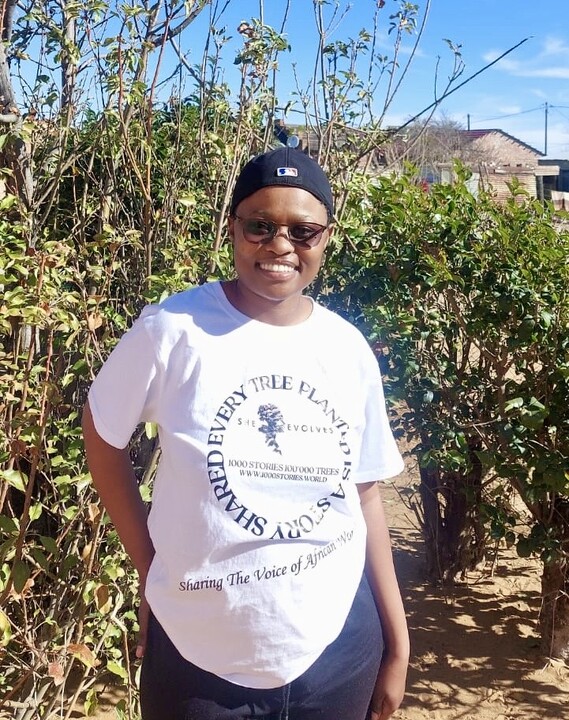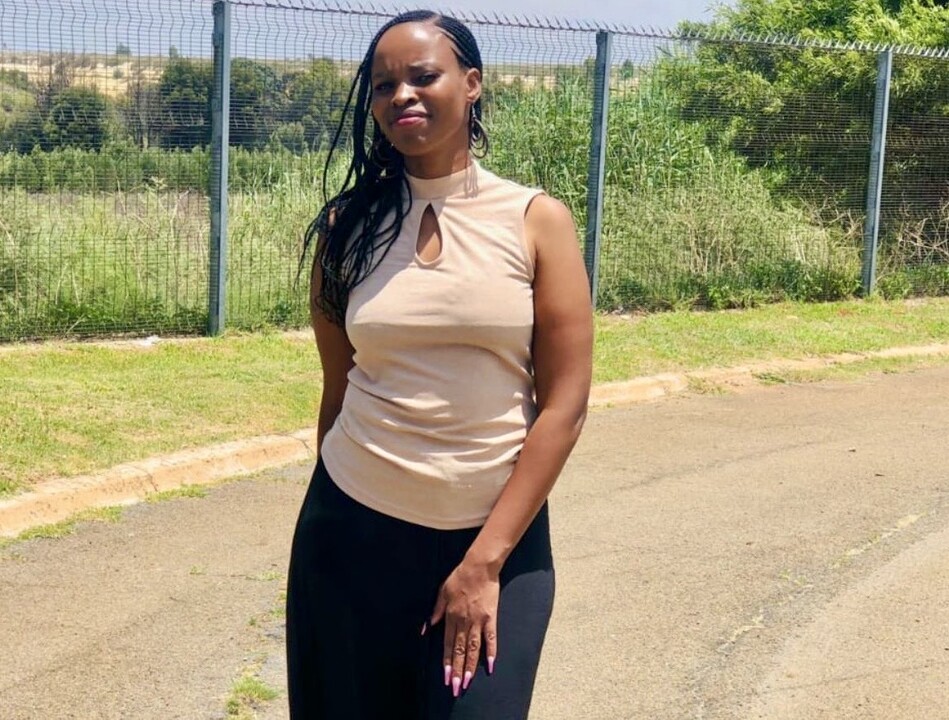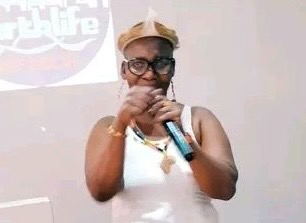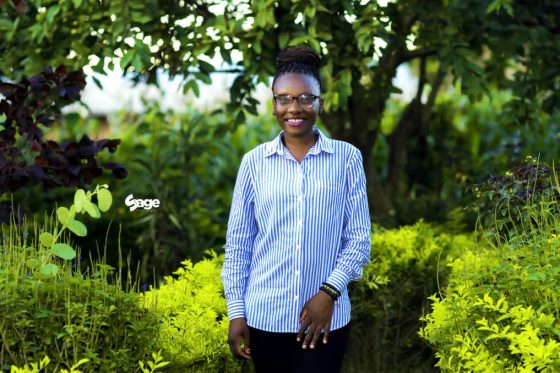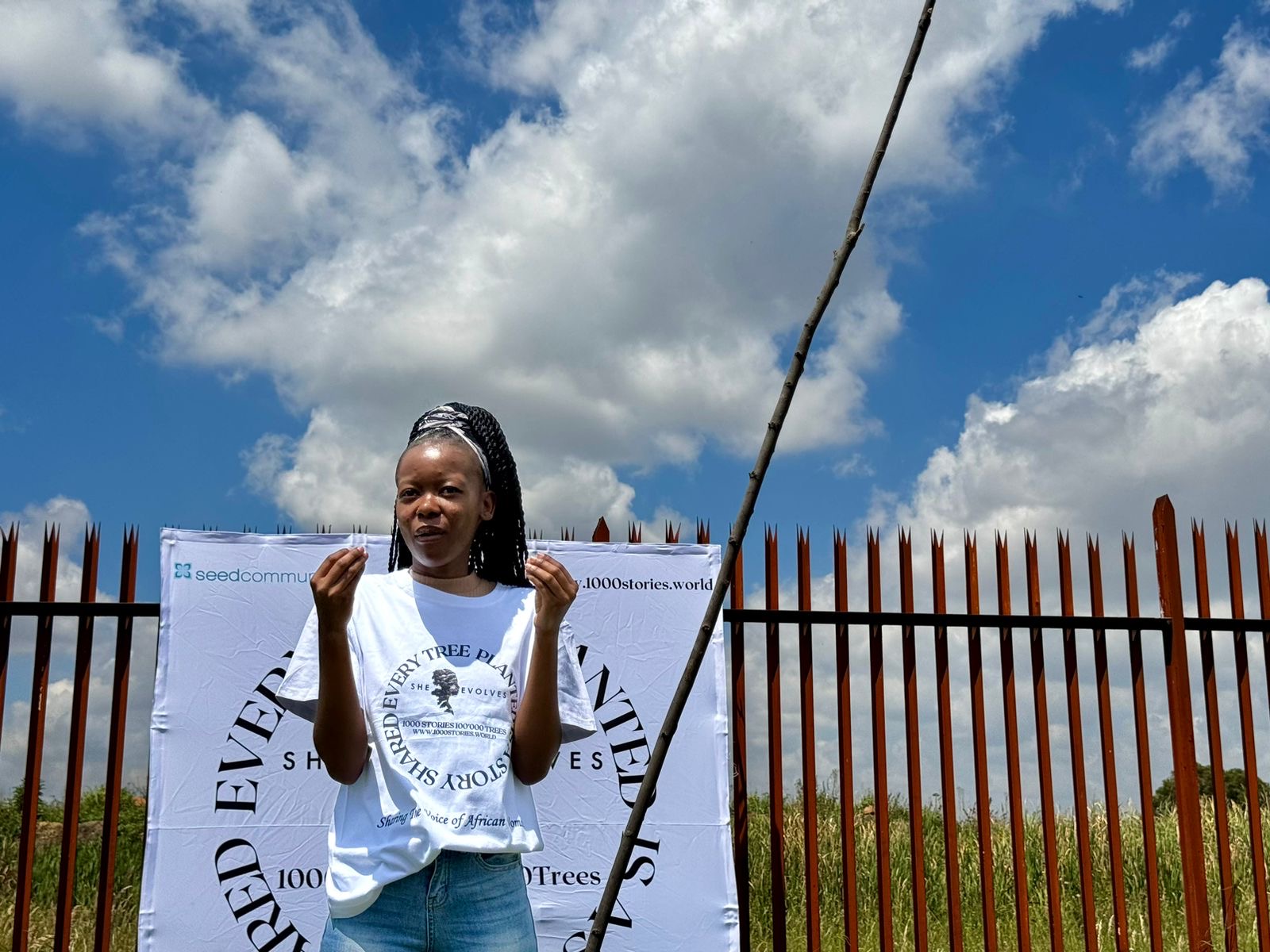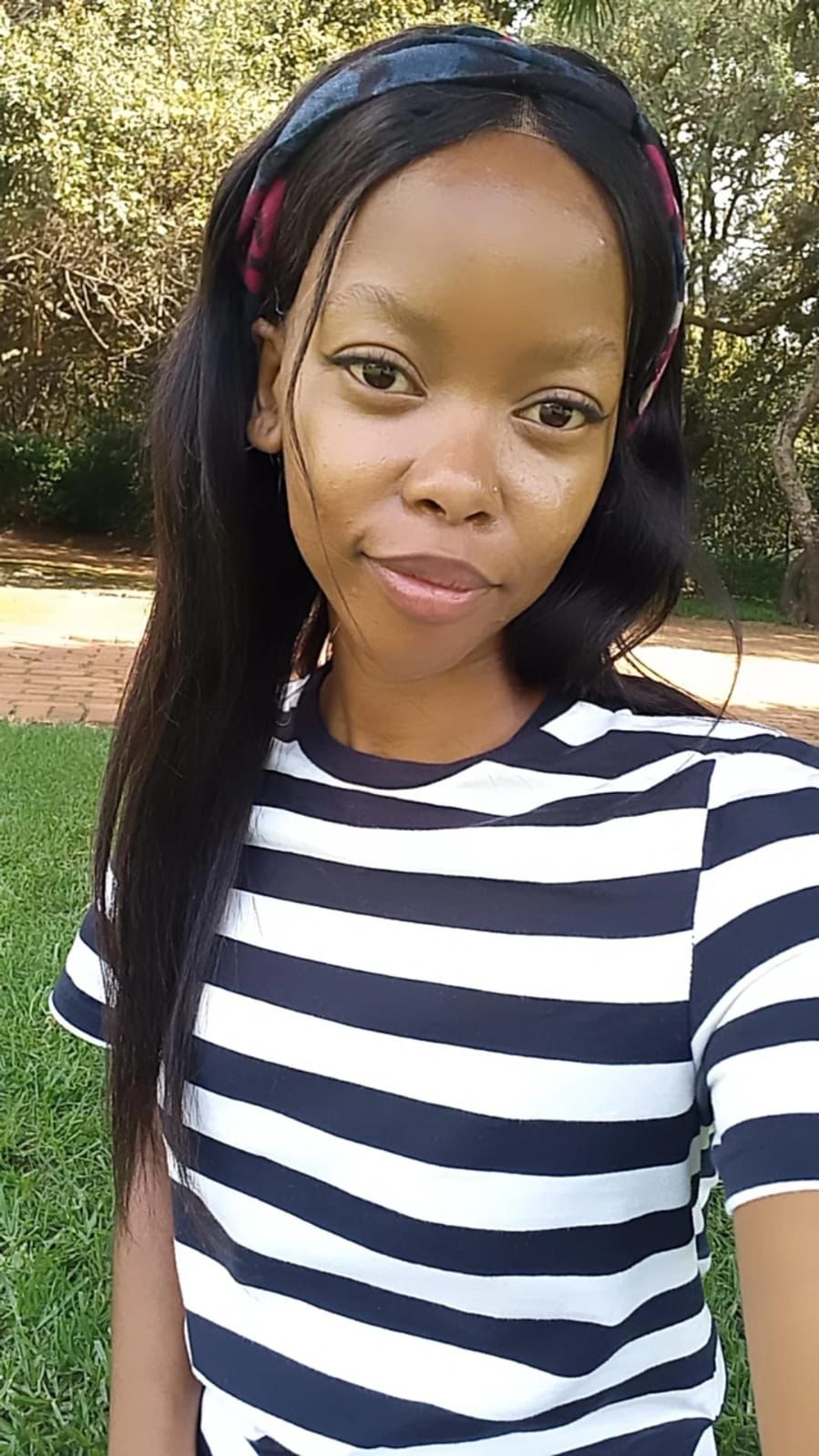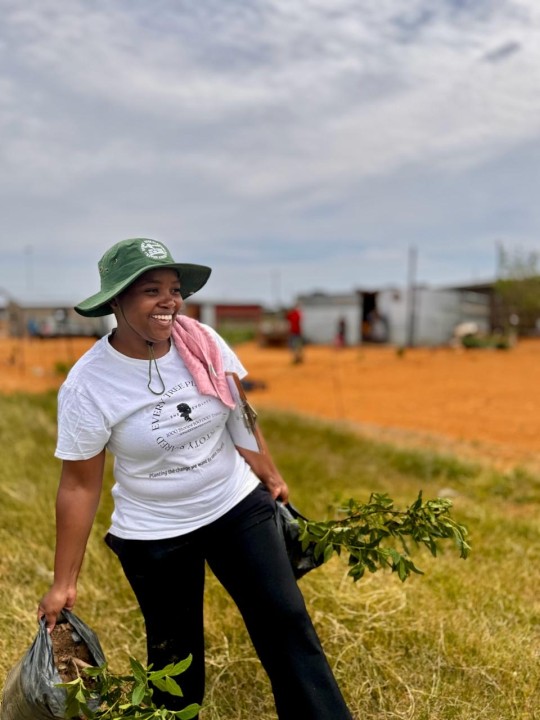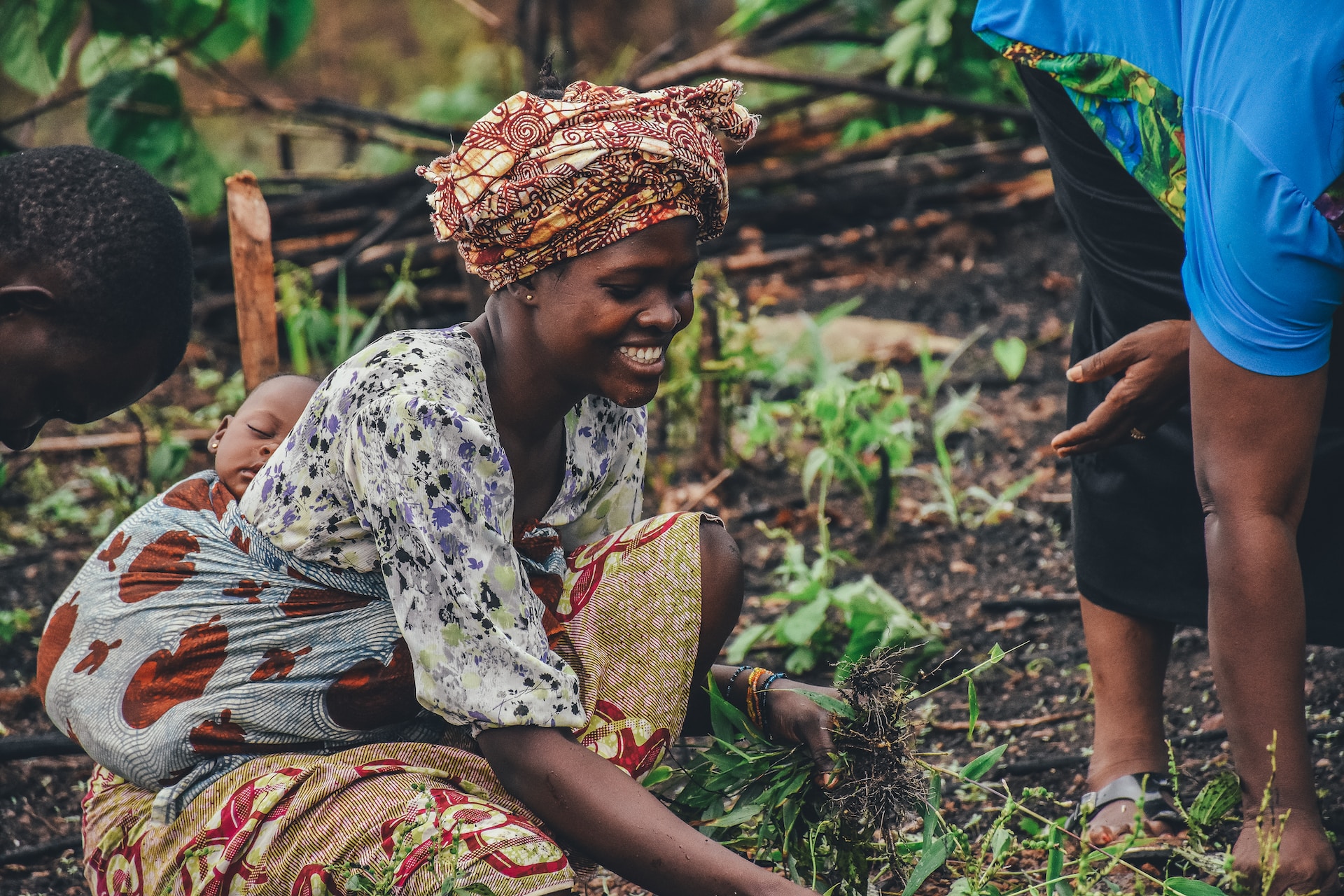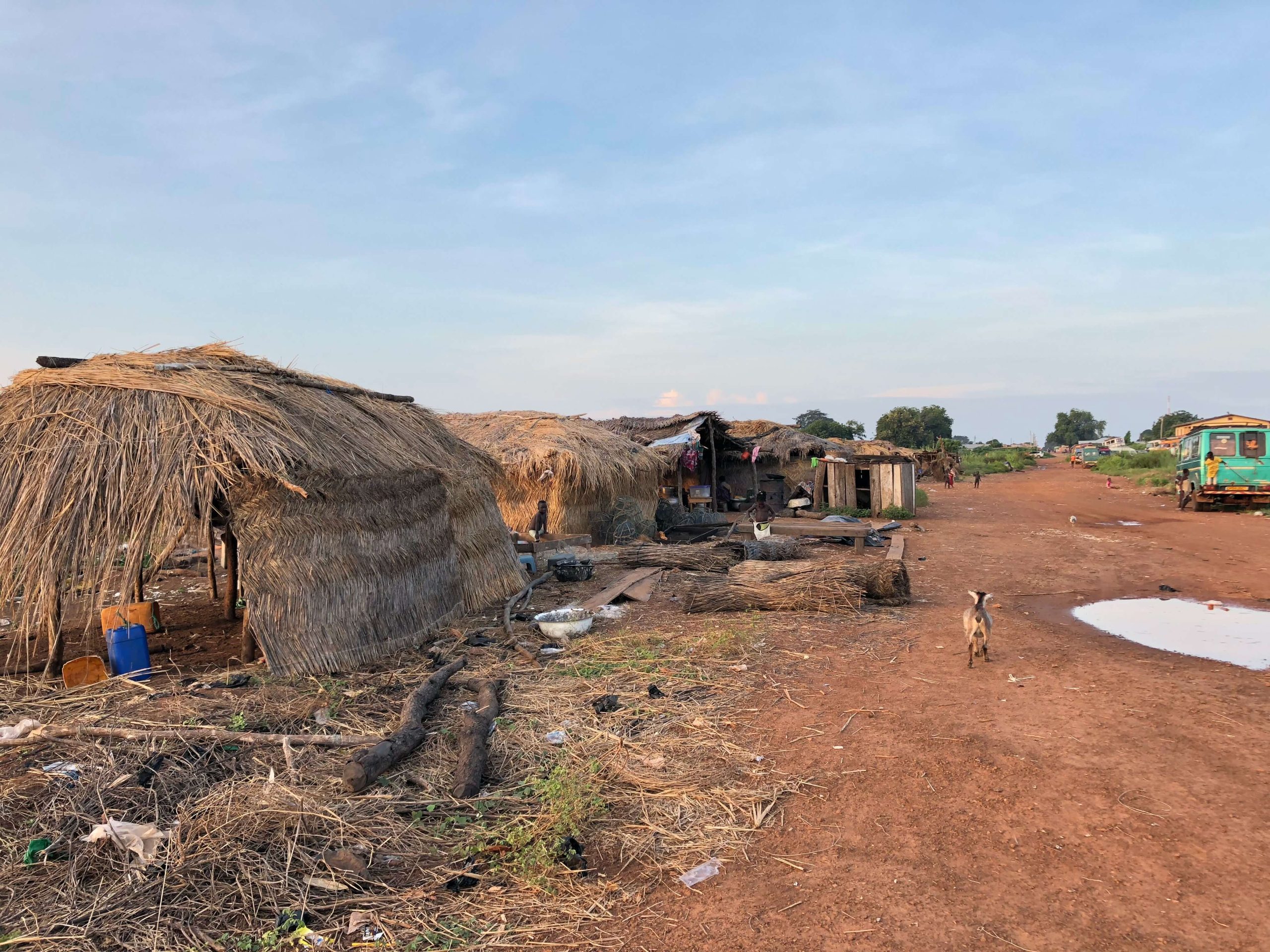2024 winners of theMail & Guardian Greening the Future Awards for Biodiversity Stewardship
Celebrating Environment Heroes
The Mail & Guardian Greening the Future awards, which was launched in 1998, is an annual celebration of individuals, companies, communities and NGOs busy working on making the world a better place for us and future generations.
The awards take place on 30 November to coincide with the 2023 United Nations Climate Change Conference, COP 28, in November and December.
COP28 aims to boost policies and investments that protect lives and livelihoods and support community resilience and stability.
Millions of people in South Africa and the continent are exposed to drought, floods, fires and extreme heat, which will worsen if we don’t act.
Greening the Future recognises the real heroes who tackle problems ranging from biodiversity loss to polluted air and water that have been exacerbated by climate change.
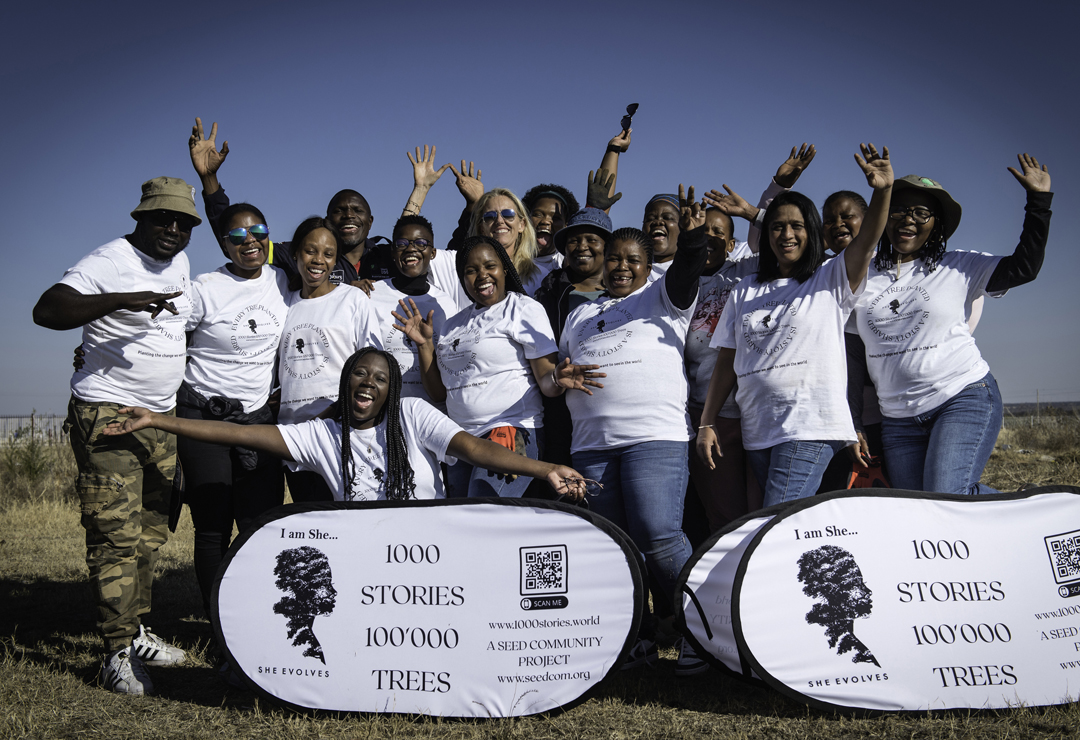
Biodiversity Stewardship.
“You cannot protect the environment unless you empower people, you inform them, and you help them understand that these resources are their own, that they must protect them.” — Wangari Maathai
This pioneering tree-planting initiative by Christina Vestey and Bishop Ngobeli weaves the stories and life experiences of African women into the fabric of transformative change. In collaboration with Johannesburg City Parks and Zoo, this project addresses the social problems facing women amid the effects of climate change. Over this past year, the initiative has grown from three people to more than 40, now including men, who have planted more than 4 000 trees. This movement is about more than storytelling — it’s about empowerment. It brings people together to share their stories, plant trees and forge unbreakable connections with each other and the planet. The four-month programme unites landscapes with each participant’s vision to create a legacy in their community. Through on-site and virtual modules, along with group and individual sessions, participants share their stories and plant trees. The goal is for participants to see themselves reflected, to understand their value and role in society and to take responsibility for their environment. In light of the pressing social and environmental problems confronting people, there is a need to reconnect and strengthen bonds with land and nature. The widening disconnect between humanity and the natural world has contributed to global crises, exacerbating mental health problems, social fractures and economic disparity ,while pushing the natural world toward a tipping point. She Evolves is a commitment to creating a sustainable future.
Greatest achievements
The greatest achievement of this project is the collective effect of every participant’s efforts coming together to create real, meaningful results. Each individual achievement has contributed to our shared goals, enabling us to grow and expand into more communities.
What advice would you give to future generations?
If only we had listened and understood that we cannot separate ourselves from Mother Nature; we are an intrinsic part of her ecosystem and the custodians of her gifts. The African philosophy of ubuntu — I am because you are — reminds us that we are because the Earth is. It speaks to our shared humanity and our place within the natural world. Climate change, pollution and biodiversity loss reveal the dangers of neglecting this responsibility. By protecting the environment, we protect ourselves and ensure future generations can thrive.
Meet Nolia Moshodi, a Changemaker from Hoopstad
My name is Nolia Moshodi, and I am a mother and a passionate advocate for women’s health and well-being, especially for young African, Black, and Brown women. My journey into raising awareness and advocating for issues affecting women is deeply personal and profoundly shaped by my own experiences with cancer.
I carry the genes for potential generational cancer from both my parents. My mother and my grandfather both lost their battles with cancer, and their losses left me grappling with the fear of what my future might hold.
When my daughter was born five years ago, I was advised to get a mammogram. But life quickly became overwhelming, and I had to put off the appointment. I wasn’t ready to face the reality of my family’s cancer history. I felt like I was robbed of a chance to prepare for a future that seemed uncertain and very frightening.
This experience has taught me just how important it is, as individuals, to understand our genetic history. It’s not just about knowing our family’s health issues; it’s about how we confront and manage these challenges before they become difficult or impossible to deal with. Our children rely on us for guidance. They deserve the benefit of our awareness and honesty to help equip them for their own future.
I have always been driven by a desire to make a difference, both in my own life and in the lives of others. I want Black children to know that their worth isn’t determined by their circumstances or struggles but by their hearts and actions. My mother was my hero and inspiration. These goals and desire to bring about change in my community are inspired by the work she used to do when she was still alive.
My mother’s legacy of giving back (even when she didn’t have much herself) continues to inspire me. I remember how she would take me with her when doing pick-ups and drop-offs for clothing drives, and personally delivering the clothes to families in need. One family that stands out is a single mother and her two adult sons with disabilities. My mother would dedicate her time and efforts to ensure those boys were cared for. Her compassion and dedication have profoundly shaped who I am today.
My passions keep me moving forward. They fuel my desire to bring smiles to faces and make our community stronger and more informed. I hope to inspire others to embrace their potential, face their fears with courage, and work together to create a brighter future for our children.
My name is Tsholofelo and this is a glimpse of who I am.
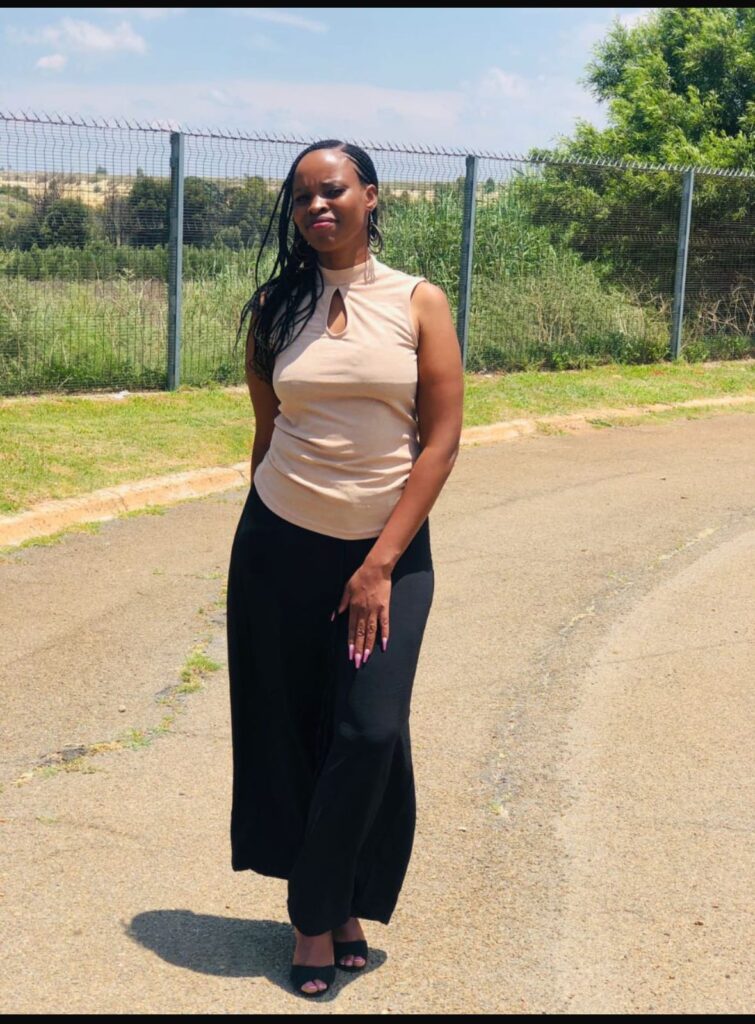 My name is Tsholofelo Mahlangu, and I live in Poortjie. I grew up in Mabopane, Pretoria, and have many fond memories from my childhood there. I have been a teacher for 20 years, specializing in social and natural sciences. Throughout my career, I have had the opportunity to work with various communities in Tshwane, my hometown. I am passionate about developing literacy projects and implementing blended learning programs, such as coding and robotics, in the communities I work with.
My name is Tsholofelo Mahlangu, and I live in Poortjie. I grew up in Mabopane, Pretoria, and have many fond memories from my childhood there. I have been a teacher for 20 years, specializing in social and natural sciences. Throughout my career, I have had the opportunity to work with various communities in Tshwane, my hometown. I am passionate about developing literacy projects and implementing blended learning programs, such as coding and robotics, in the communities I work with.
I am also a member of 02 Green in Poortjie, a role that has allowed me to connect with people, initiate positive change, and pursue my aspirations. Though I initially perceived Poortjie as more of an informal settlement compared to Pretoria, I have grown to appreciate the community and have called it home for many years.
The transformation of Poortjie through the tree sector has captivated me. Witnessing the development and introduction of greenery and beauty to the community has been remarkable. While I have a heart for teaching and nurturing young minds, I find great purpose in engaging in community-based projects. I am grateful for the opportunities I have had to be part of meaningful change through projects like those supported by 02 Green.
My passion lies in being a force for positive change within the community and making a difference in the lives of the next generation.
My social handles: Tentswalote@gmail.com
My name is Sophie, AKA "Mam Sophie" and this is my story.
My name is Sophie Ntsubulane, and I was born in the Eastern Cape. I am a 37-year-old African woman with a passion for life, changes, and bettering livelihoods. At the age of 6 years, my mom moved to Orange farm with me and my siblings. we did not know my dad at the time as he was a mine worker. When I was 8 years old, my dad returned home, and we only knew him then, but unfortunately, we never got to bond as he was an abusive, alcoholic father who was then unemployed. My mother was the only one working as a domestic worker; however, money wasn’t enough to give us a decent upbringing.
My educational background was delayed as our home was more of a child-headed family; I had to look after my siblings and ensure every household chore was done daily while my mom was at work. That resulted in me being in grade R at age 9, but that never discouraged me because I had a love for education and the drive to bring change into my life, including my siblings. One day, my teacher intervened as she noticed there was something wrong with me; the case dragged on till they took a decision to send me and my siblings to a foster care children’s home. I spent my teen years in the children’s home care till I matriculated in 2004, but that was the beginning of my second round of life disaster. Home confirmed that they could not keep me any longer because I was done with school, and no funds would be donated under my name as I’m of age. I had to pack and go back home on my last day in matric, leaving my siblings behind.
I arrived home, and my mom had another man and kids. She was then unemployed, an alcoholic and did not care of my added siblings. The situation was even worse. All that drove me to move in with a guy who Is now the father of my kids. We got our shack and shared a life together. 2005, I fell pregnant with my first child; everything changed from then as my partner started cheating on me, abused me and was never the same. Been in an abusive relationship till 2007, when I moved to my new place in Drieziek 5 to start a new life alone. With time moving, I got back with my man, and he then moved to my place.
1 day, I was on Facebook, met this woman via her clothing drive initiative, and it turned out she was going through the same thing; we shared stories and ended up forming a group to register an NPO that focused on women in abuse. That’s how I came up with Pink Spot. It is now focused on GBV, and there’s 1 exciting one,“ groom a boy child”, which will help deal with the boys at a young age before they grow to be abusive monsters whom we are faced with now as our partners because of all the traumas they endured in their upbringing. At Pink Spot, we also focused on feeding Scheme to the needy and helping children with homework daily. I ended the abusive relationship, now with my kids and focused on my NPO “ pink spot “Their growth and success mean a lot to me.
I love and enjoy helping others. I am Sophie, the so-called “ Mam Sophie” in my area. I am known for change and my strong drive to bring light to those who need it.
Thank you.
Cathrine's deep connection to Malawi is so inspiring
Meet Cathrine, a young Malawian woman who was born and raised in Zimbabwe. Despite growing up far away from her ancestral land, Cathrine was always drawn to Malawi and its beautiful landscapes. As a child, she dreamt of one day visiting her parent's homeland, and when she finally did, it was love at first sight. She was captivated by the lush greenery, cultivated fields, the rolling green hills, and the friendly, welcoming people of traditional rural African villages. 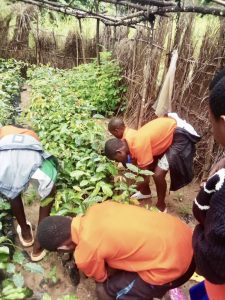
Cathrine's connection to Malawi deepened over time, even as she faced various social and financial challenges that forced her to leave her country. She never forgot the warmth and kindness of the people she had met there, and she remained committed to helping them in any way she could. 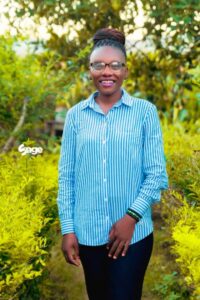
In 2021, Cathrine finally returned to Malawi to settle in her parents' village of Tukombo, located in the Northern region where the Tonga-speaking people reside. She was eager to reconnect with her roots and to make a positive impact on her community. She reached out to the Traditional Authority (TA) of the village's land to understand the most pressing needs in the area, and she was determined to find a way to help, even though she had no resources of her own.
Cathrine's unwavering dedication to her community inspired her to seek out like-minded friends who shared her vision of creating a better Africa for present and future generations. Together, they embarked on a journey of asking for assistance, and Cathrine was humbled by the overwhelming response from her friends, who were eager to help her build her village and work towards creating a better Africa, one village at a time. Despite having limited resources, Cathrine was able to make a significant impact on the lives of those in need in her village by providing assistance and support whenever needed. 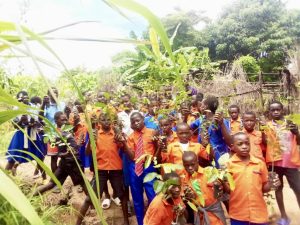
Cathrine's passion for the environment led her to get involved in a tree-planting project in her community of Tukombo. She collaborated with Chifundo from the DFFE, and together, they planted trees in a school and an elderly home. Cathrine had to seek permission from the Chief, Zilakoma - Mr Wellington, to run the project on their land, and he was eager to assist Cathrine in carrying out her vision to transform the landscapes while preserving the cultures and traditions that her ancestors had worked so hard to build. Her approach to the tree-planting project was unique and inspiring. She not only taught pupils how to plant trees but also explained why it was important and how to care for them. She encouraged each student to plant trees with a purpose and to name each tree they planted so they could nurture and protect it as a living treasure. Cathrine's dedication to planting trees and helping those in need is truly admirable. Her efforts have given hope for the future of our planet and the natural world. Her story is a testament to the fact that one person can make a significant difference in their community with determination and a clear vision.
Meet Naledi Mokgautsi, a Change Maker from Orange Farm
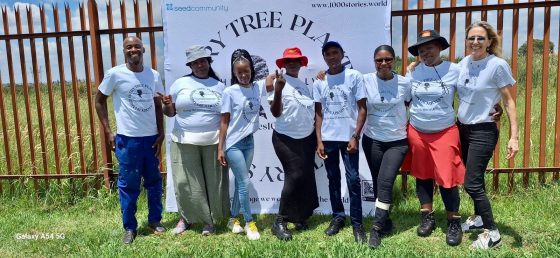 Meet Naledi Mokgautsi, a young woman from Orange Farm, Johannesburg, South Africa. Naledi is a part of our project, She Evolves 1000 Stories 100 000 Trees, which aims to make the world a better place by planting trees and sharing black and brown African stories.
Meet Naledi Mokgautsi, a young woman from Orange Farm, Johannesburg, South Africa. Naledi is a part of our project, She Evolves 1000 Stories 100 000 Trees, which aims to make the world a better place by planting trees and sharing black and brown African stories.
In a nutshell... Naledi comes from a large family and has attended schools in various locations around Johannesburg before she went to university. She believes in always moving forward and helping others. She has volunteered her time in teaching children about computers and researching mental health.
Naledi is not just about work. She enjoys baking, drawing, and exploring new places. In fact, she runs a small dessert shop from her home and dreams of having a bakery combined with a bookstore one day. Her multifaceted personality is something that we can all relate to and draw inspiration from.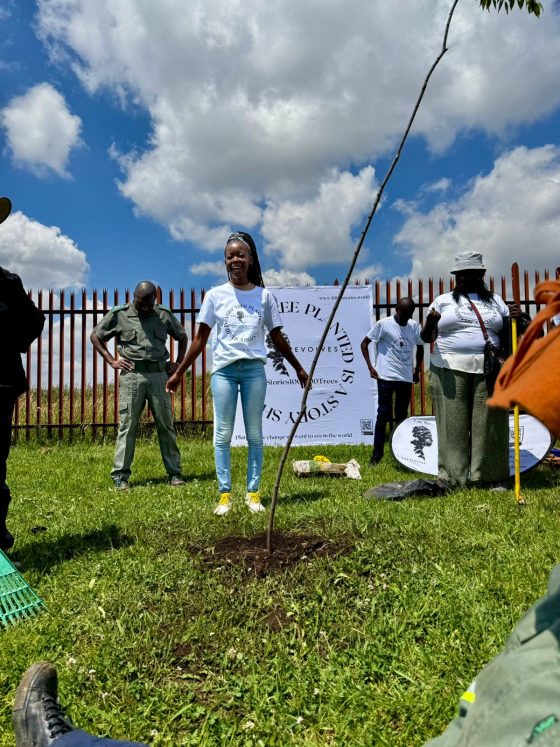
As part of the 1000Stories 100 000Trees initiative, Naledi has not only planted trees but also fearlessly shared her story with a diverse group of men and women at her former school, Laus Deo Primary. Her dream is to uplift her community and create a better environment for all. Naledi firmly believes that even the smallest actions, such as planting trees and sharing personal experiences, can lead to significant change.
However, Naledi is not stopping there. She has bigger plans to do even more for her community and travel the world. Recently, Naledi has engaged her community by helping them plant trees, raising awareness, and educating them about the importance thereof. Her favourite saying is "You gotta keep going," which reminds her to never give up, no matter how hard things get.
As a Changemaker, Naledi shows that anyone, no matter where they come from, can make a big impact and help others.
Naledi’s Story On Navigating Mental Health Challenges And Finding Purpose
Sometimes, we suffer in silence. I started having mental health issues at a young age, not knowing what they were exactly, and in turn, they formed part of my personality. These mental health issues then started being apparent in my early adult years; they were a manifestation of all my childhood traumas. I learned that I had depression and anxiety when I went to varsity and did more research on what I was going through.
I found that I had all the symptoms: I had no desire to live, I had given up and struggled with being in social situations and articulating what I wanted or needed, and I was very withdrawn and always very negative-minded. Because I was quiet, my mind was a dangerous place to live in. I then attempted to commit suicide with failure. I had a support system that tried their best to help me overcome this even though they didn’t understand what I was going through.
As time went on, I then started to read self-help books because I was tired of living in constant pain. I didn’t want to survive; I wanted to live. I drove myself out of the pit of depression even though it was a very long and tough battle. Today, I am happy I get to tell my story. There’s a lot that people go through and never get assistance or even self-help. Mental health issues are a very vital part of our overall health as they distort views of an individual in so many ways. It is important to keep healthy habits for our mental health so we can not only live but thrive.
If I were to offer advice to someone going through similar mental health challenges, my primary suggestion would be to find the root cause of their distress because mental health challenges often stem from deeper, underlying issues. Identifying what specifically triggers your emotional responses and understanding the reasons behind these triggers are crucial steps. Uncovering the ‘whys’ paves the way to addressing and resolving the core issues at hand. While this approach may prove beneficial for some, it’s important to acknowledge that it might not be effective for everyone.
Moreover, it’s important to allow yourself to experience and process your emotions fully – but refrain from acting impulsively on negative thoughts, as such actions can be harmful and sometimes even worse. Allowing yourself the space to express feelings such as sadness or anger is very important for releasing stress. For those who find it difficult to express emotions openly, journaling could be a helpful option.
Above all, if you’re struggling with mental health issues, I think it is important to be kind to yourself more than anything. Practice self-love through doing things that make you feel alive and happy. This helped me to find myself again and to find purpose in little things.
Kedibone’s Ongoing Journey With She Evolves
Kedibone Mahlatsi is a remarkable young woman and a mother of three children who lives in Hoopstad, a small town in the Free State province of South Africa. Amongst many other things she does, she is a passionate advocate for tree planting and storytelling and is already making a practical positive impact in her community. Her journey is inspiring and speaks to her resilience, compassion, and steadfast commitment to making a difference. In this piece, we will delve into Kedibone’s inspiring efforts and the profound impact she’s making, specifically through the “1000 Stories, 100,000 Trees” initiative.
 Growing up in Hoopstad, Kedibone witnessed the challenges of poverty, chaos and injustice, but nothing stopped her from becoming the remarkable person we know today. Her love for planting was inspired by her grandmother, who had a green thumb and taught Kedibone about the importance of nurturing plants and trees. As she grew older, Kedibone recognised the significance of tree planting in addressing environmental issues in her community, which prompted her to venture into organic farming, gardening, and tree planting.
Growing up in Hoopstad, Kedibone witnessed the challenges of poverty, chaos and injustice, but nothing stopped her from becoming the remarkable person we know today. Her love for planting was inspired by her grandmother, who had a green thumb and taught Kedibone about the importance of nurturing plants and trees. As she grew older, Kedibone recognised the significance of tree planting in addressing environmental issues in her community, which prompted her to venture into organic farming, gardening, and tree planting.
 Between 2015 and 2021, she worked at Senwes, a leading agricultural company in South Africa. During her time there, Kedibone equipped herself with knowledge of organic farming and helped to promote sustainable farming practices. However, her commitment to community development extended beyond the workplace. At some point recently, she offered a helping hand to the Blessing Disabled Home, a local organisation that provides care for people with disabilities, demonstrating her dedication to helping those in need. Not only that, Kedibone has also been of greater assistance in one of the children’s creche/preschools by donating a few needed resources for the kids to benefit from. Her involvement in community projects, such as raising donations for essentials, showcased her as a true changemaker in her community.
Between 2015 and 2021, she worked at Senwes, a leading agricultural company in South Africa. During her time there, Kedibone equipped herself with knowledge of organic farming and helped to promote sustainable farming practices. However, her commitment to community development extended beyond the workplace. At some point recently, she offered a helping hand to the Blessing Disabled Home, a local organisation that provides care for people with disabilities, demonstrating her dedication to helping those in need. Not only that, Kedibone has also been of greater assistance in one of the children’s creche/preschools by donating a few needed resources for the kids to benefit from. Her involvement in community projects, such as raising donations for essentials, showcased her as a true changemaker in her community.

Kedibone has gone through a tough and personal journey that has been marked by tragedy, loss, and lots more challenges. She grew up in a challenging family background and, as a result, faced many losses in a short period of time, including the death of her mother, sister, uncle, and grandmother. She also experienced harassment from an early age through her early adulthood, which added to her already long list of obstacles. Despite these setbacks, Kedibone’s dedication shines through, symbolised by her determination to bring about change in her community wherever possible.
On the 1st and 2nd of Feb 2024, Kedibone led the She Evolves tree planting and storytelling project, called 1000Stories, 100, 000 Trees, in a nearby community called Riverside, Hoopstad, which exemplifies her commitment to creating positive change regardless of circumstances. Leading the charge, she, along with local greening partner Clement, planted an impressive 192 trees in the community – within two days. Just reflecting on the moment, I have a goosebumps rush. The project not only transforms landscapes but also nurtures social cohesion and strengthens community bonds.
 Kedibone’s journey is symbolised by a plant she aptly named “Hope” from one of her home’s garden plants. This tangible reminder of transformation reflects her personal evolution and the optimism that emerged from challenging circumstances. It also represents the hope that Kedibone is planting in her community, inspiring others to believe in positive change – and to do the same.
Kedibone’s journey is symbolised by a plant she aptly named “Hope” from one of her home’s garden plants. This tangible reminder of transformation reflects her personal evolution and the optimism that emerged from challenging circumstances. It also represents the hope that Kedibone is planting in her community, inspiring others to believe in positive change – and to do the same.

Kedibone Mahlatse’s journey from adversity to resilience is a sign of hope for her community and beyond. Her dedication to community development, environmental sustainability, and personal growth make her a true heroine deserving of recognition on a global scale. Through “1000 Stories, 100,000 Trees,” Kedibone is leaving an enduring legacy/mark that will continue to blossom for years to come. Her efforts remind us that even in the face of hardships, we can plant seeds of change that will grow into a brighter future.
Embracing African Solutions for African Problems
Africa has a history of not owning its own solutions. This is because Africa has been exploited by the international arena for decades, which meant that every economic, social and environmental challenge always had western inspired solutions. However, Africans have proved to have tailor-made solutions to their challenges using available resources and giving confidence in ownership. Malawi is common in finding or designing solutions to confront its daily challenges. Due to the multifaceted problems that the country encounters, the high cost of living, the fuel crisis, the skyrocketing unemployment rate etc., Kabaza (Bicycle) have become the most effective and efficient means of transport in the country. The streets of Malawi are a craze of Kabaza drivers going up and down looking for customers/passengers.
The encouraging part of this business is that most Kabaza owners are young adults, which has eased the burden of unemployment and reduced crime. The Kabaza is easily accessible in any part of the country and therefore functions informally like an uber as one can get a Kabaza from anywhere, even as close as getting one by the doorstep. In terms of job creation, it is a value concept. It only requires a few resources or capital. Anyone can start the trade as long as they have a bicycle. The Kabaza business is meeting a critical need in Malawi by offering the most flexible and affordable means of transport. Undoubtedly, it brings socio-economic groups out of poverty and empowers the youth to be self-reliant. Therefore, the business is an easy start-up since most homes, on average own a bicycle. In addition, it is an effective way of enhancing economic and entrepreneurial growth. The business also contributes to empowering local communities to help them survive economically, socially and physically.
The Kabaza story began in Karonga, in early 2005, a district located in the Northern Region of Malawi under a business called Cargo. This small trade became very lucrative in Karonga, attracting many unemployed youths and young adults. In no time, they became Cargo business owners with an enviable income, sustaining their families and day-to-day living costs. Subsequently, the business became overcrowded, resulting in the spread of the industry in other parts of Malawi. This overwhelmingly fast-paced spread eventually led to urbanisation, unemployment and adequate, affordable intra-city public and commercial transport. As a result, the Kabaza business became an attractive venture and captivated a few established businessmen, the likes of Mr Salumpha based in Mzuzu. He was the first to buy about 5 000 Kabaza, employing 5 000 youths at the time, which attracted the government's attention in recognising and appreciating his job creation efforts.
This trade in a developing country has various advantages: availability and affordability. They can also easily traverse through narrow roads and rough terrain and easily navigate the most jammed roads. They quickly reach remote areas and meander through the hectic urban traffic, meeting some urban residents' unmet transport needs. This type of transportation has quickly become popular not only in Malawi but also in other countries. Its acceptance has increased steadily and has become the primary mode of transportation in Malawi and Africa. It has become a means of transportation regularly used by people of all ages, men and women alike, mainly middle to lower-income earners.
Unfortunately, not all Malawians embrace this means of transport as it is associated with the less privileged. One pointed out and said, "the problem with Africans is that we want to jump stages of economic and industrial growth, instead of wishing to be developed in one day, it is good to start with what we have. I see uber eats in Kenya being delivered on small motorbikes, and people get food on time without worrying about traffic jams. In New York deliveries are even done on skateboards" Another said, "it is environmentally friendly as there are no carbon emissions."
Indeed, it is time we embrace African solutions to African problems towards a united, prosperous, peaceful Africa. To build the Africa we want to see and live in, we need to unlearn certain imported principles irrelevant to our existence and embrace our authenticity and being. As Africans, we need to navigate our resources and bank on Africa's future, having a sense of self-reliance, responsibility, pride and ownership. We need to re-brand Africa and leave the image of a permanently troubled land behind or totally erase it.
In conclusion, Malawi is a beautiful country with a vibrant populous of inventors and solutions-minded youths. If we could all embrace and support them, we could build a better Malawi and a great Africa.
Story by:
Cathrine Banda, from Mzuzu Malawi. She is a Community Activist, Motivational Speaker, Writer, Poet, Former Radio Presenter The 1873 FM, Johannesburg South Africa
cathrinetwabi@gmail.com
Diary of a Village Girl: Creating Hope in my Community
I have always had the urge to go back home to Malawi and be part of the builders of my community and the country at large. Though born and raised in Zimbabwe by Malawian parents, my love for Malawi developed when I arrived there in 2004, still a child yet old enough to know good from the bad.
I instantly fell in love with an odd way of life in my parents' villages, both my mother's and father's sides. I fell in love with the country's innocence, the people oblivious of a life other than their way of living. Indeed, ignorance sometimes is bliss. I was raised, in my view, in an average home with running water, a bathtub, electricity, a stove, a fridge, and sleeping on a bed. I naively thought that this lifestyle was a common way of life for everyone everywhere across the world. Sleeping on a mukeka or African mat in my parent's village in Malawi was not a shock but a roller-coaster adventure for me. Fetching water was the most exhilarating experience. Carrying tons of buckets with my cousins and brothers, contrary to our small family way back in Zimbabwe, I was faced with many cousins in Malawi, an unfamiliar sight, but it was such a pleasure. We would take turns swinging the borehole wheel until we filled all the buckets.
Cooking was quite exciting, and mealtime was beyond enjoyable. We sat amidst more than 20 people near the kitchen, chit-chatting while we waited for the food to be served. We had to sit in groups, males separate from females. Just as the mothers comprised their separate group, so did the children. Each group had to be served from a communal dish according to their gender and age.
After three months of this pleasurable village experience, my father took me back to Zimbabwe. I vowed in my heart that I would return. Years later, the nudge to return to Malawi was still stirring in me. In 2014, a mature woman, I decided to relocate and work in Malawi. By then, I understood that some of the first pleasant experiences I had encountered resulted from lack and poverty. I worked in Malawi for eight months, only to be so disappointed by the new experiences of hardships. The people and the country were going through tough times due to poor governance and political misalignment. At that time, I did not find anything pleasant about my country, so I left despite my inward-burning desire to help.
Subsequently, in 2021, I mentally prepared myself for disappointment and discomfort. I went to live in Tukombo, my parent's village in Malawi's Northern region. This village comprises of Tonga-speaking people, one of the tribes that pioneered multi-party rule through Aleke Banda and are also known to be the most intelligent and educated tribe in Malawi.
I realised that my community needed help urgently. So, I contacted the Traditional Authority (TA) of the land to help and found out which areas needed immediate attention. To my shock, I was given a Bible of needs, and with no financial resources, I felt helpless and hopeless. However, although hopeless, I was confident that I could reach out to some of my trusted and valued friends with whom I had built trustful relationships over the years based on our common interests, spiritual foundation, or vision of building the Africa we want. It is an Africa with a prosperous future for the present and future generations.
I embarked on a solo journey of knocking on every one of my friend's doors for financial assistance, hoping to have a good response. Indeed, most of my friends fell head over heels without hesitation in extending their financial resources in helping to build my village while building the Africa we want, one village at a time. Yes, there have been a few exceptions whereby I had some emotional wrecking experiences. Some potential donors I approached thought that I shouldn't be "appealing" for financial assistance at this stage in my life and that I was a failure and an embarrassment to society. Therefore, I should have never reached out to them or shared the philanthropic request work I was doing. Nevertheless, through various resources and help from friends, we have managed to renovate the village court/office, helped construct a nursery block, bought chairs for the community court and distributed food parcels and clothes to the community. Once the news started reaching out to some of the people in the diaspora who shared the same passion for building or facelifting the community, the response to contribute multiplied tremendously. Many reached out to me and expressed their commitment to joining hands to improve the village.
I partnered with my fellow brothers and sisters from Tukombo, mainly based outside the country, to extend the existing clinic into a hospital. Each person would contribute as little as US$6. With all this being done with a couple of close friends, the most mind-boggling question comes to mind: How does the government of Malawi fail to deliver on the smallest of services when a small group of friends can bring change within a couple of months? Where does our government fail in service delivery? What are the priorities in the national expenditure, and what should they be?
Meanwhile, Tukombo village has diverse so-called development committees that convene countless meetings, with little or no tangible deliverables on the ground. Is it because of a lack of focus on the bigger picture regarding vision, genuine sense of duty, unity for purpose, or unity of purpose? Could this be attributed to a lack of a shared mindset, education, drive or enthusiasm to live well in Malawi?
Unfortunately, despite the continent's immense potential, there are similar heart-wrenching cases across Africa. The abovementioned drawbacks pose unsurmountable obstacles to true meaningful emancipation and economic freedom. But we must face these challenges and forge a more livable and prosperous Africa. Our experience in Tukumbo village must help us to create a hopeful community with successful tangible development goals.
Written by:
Cathrine Banda, Community Activist
Tukombo Village, Nkhatabay, Malawi
Mobile: +265 881 69 30 58
Email: cathrinetwabi@gmail.com

